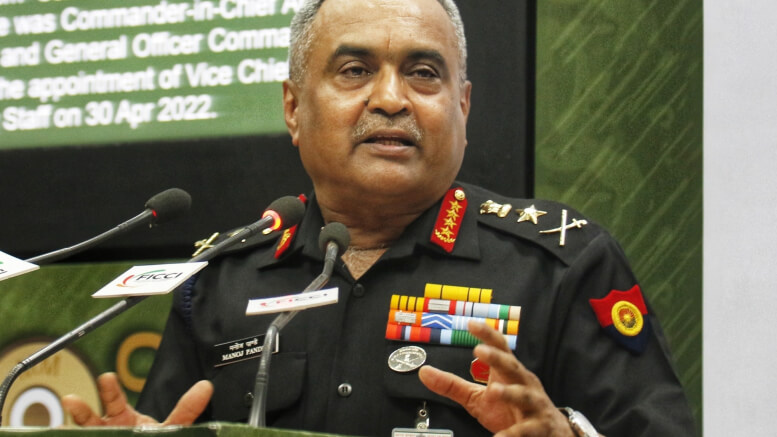Indian Chief of Army Staff Gen. Manoj Pande delivered a keynote address on China during a conference on the theme “China’s Rise & Its Global Implications” in Pune on Monday. He spoke of Beijing’s economic and military successes, the global impact of these developments, and the regional and domestic concerns for India.
“Multifaceted” Economic Growth
Gen. Pande said China’s “industrial prowess” has placed it in a dominating position as the “world’s factory.” He added that Beijing is the “largest economy in purchasing power parity terms.”
Later in his keynote address, he highlighted that China “intends to challenge the world order led by the US” to become the “leading superpower.”
China’s “International Network of Coercion”
Gen. Pande stressed that China’s economic rise is “multifaceted” and warned of Beijing’s “predatory economics” through which it has built an “international network of coercion.”
He said Beijing is looking to “expand [its] sphere of influence through economic manoeuvring, weaponisation of resource supply chains, financing large infrastructure projects with scant regard for environmental and safety standards, and saddling recipient countries with unsustainable debt.”
The Army chief further warned of other issues, including China’s theft of intellectual property rights and other unfair practices such as stealing trade secrets and technology from other countries.
To support his argument, he cited the example of China’s emergence in the technology industry, wherein it lured and poached scientists and researchers with “unrestricted funding offers.” As a result, the country has made unprecedented leaps in technology developments, including in industries such as defence, space, energy, artificial intelligence, and robotics, he said.
On the international front, Gen. Pande noted that China’s “economic heft” and “leverages” have made it capable of “unfolding a brute force economic policy.” Additionally, he noted that the Chinese government uses its leadership in international institutions and permanent membership at the UN Security Council to “control the world.”
Impact on Military Strength
Gen. Pande highlighted that China has enhanced its military capabilities by leveraging strides in global economic development. In particular, he attributed China’s military prowess due to its successes in using artificial intelligence in war systems.
More concerningly, he stressed that China has repeatedly shown “willingness to project its military power” by aggressively posturing its military bases in the Indo-Pacific. Citing other examples of Beijing’s activities along its border with India and the Taiwan Strait, Gen. Pande highlighted that Beijing’s compliance with international laws is based on the principle “might is right.”
2/2 I hope @adgpi will release an official transcript of the Indian army chief's China speech at the conference hosted by Savitribai Phule Pune University & Centre for China Analysis and Strategy.
— Tanvi Madan (@tanvi_madan) March 27, 2023
My transcription continues below.
Video at: https://t.co/tXrbP1rQA1 pic.twitter.com/L1cV8zAxRH
In particular, Gen. Pande discussed China’s actions in the Indo-Pacific, a region that has grown in influence and importance over the years as it sees economic growth and power tussles between Beijing and the West. Nevertheless, he lauded the success of “strategic architectures” like the Quad, which is aimed at taming Beijing’s aggression.
On South Asia
The Army chief further highlighted that in South Asia, developing countries have “fallen prey to Chinese economic traps.” To this end, he cited examples such as China’s Belt and Road Initiative and the China-Pakistan Economic Corridor.
He warned that the projects are infested with a lack of accountability and excessive debts at high-interest rates, which other South Asian nations such as Sri Lanka and Bangladesh are growing increasingly susceptible to.
India’s Concern
Gen. Pande highlighted that territorial disputes and contested claims by China tarnish the Line of Actual Control, and its transgressions are seen as a “potential trigger for escalation.” He added that China’s actions are in violation of previous agreements and protocols signed in 1993, 1996, 2005, and 2013.
General Manoj Pande #COAS delivered the Keynote Address at the India-Africa Chiefs’ Conclave. #COAS extended his welcome to all Defence Chiefs & Representatives and emphasised on further strengthening mutual cooperation between India & Africa.#IndiaAfricaFriendship pic.twitter.com/2pq8b9jiST
— ADG PI - INDIAN ARMY (@adgpi) March 28, 2023
He reiterated a statement by Indian External Affairs Minister, S. Jaishankar, to highlight that “the boundary issue cannot be divorced from bilateral relations.”
On India’s response to the threats, he said that Indian armed forces remain focused on the northern borders and are working with “all agencies” to “upgrade the infrastructure.” He affirmed that the Army is “prepared to deal with any contingency.” He added: “Our preparedness remains of a higher order, and troops continue to deal with the PLA in a firm, resolute, and measured manner while ensuring the sanctity of our claims.”

